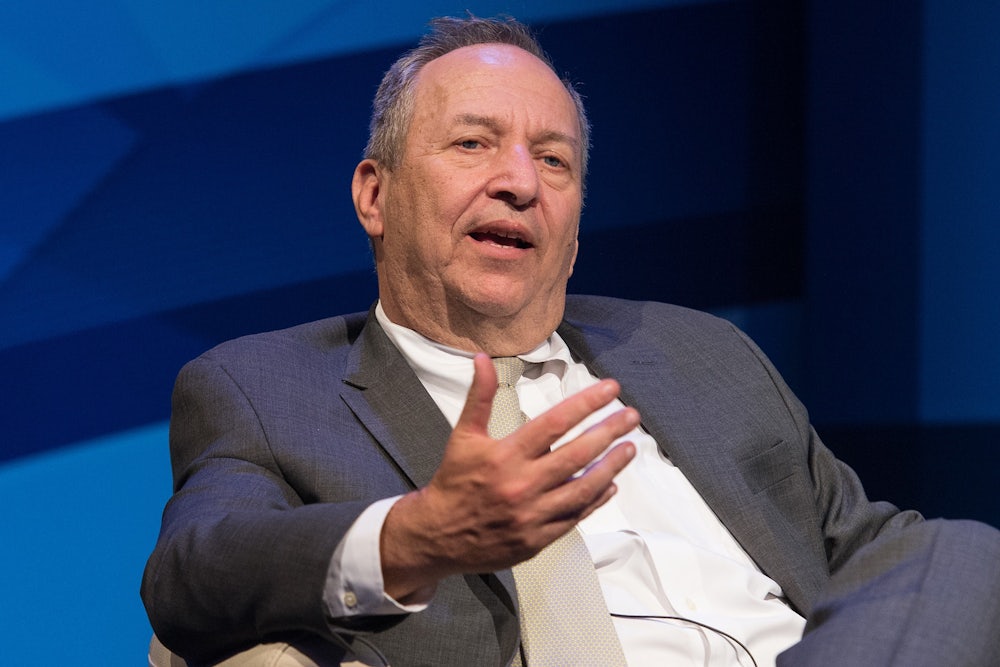For a few short hours from Thursday afternoon to Friday morning, Larry Summers seemed to be on the verge of blowing up another big stimulus. Back in 2009, Summers, then the White House’s top economic adviser, had pushed Barack Obama to go small, based on overoptimistic economic projections and worries about political blowback, a catastrophic decision for both the country and the Democratic Party, which went on to get drubbed in the 2010 midterms. Now Summers was back on his bullshit. In a Washington Post op-ed, Summers argued that the Biden administration’s proposed $1.9 trillion bill was simply too big.
“Whereas the Obama stimulus was about half as large as the output shortfall, the proposed Biden stimulus is three times as large as the projected shortfall. Relative to the size of the gap being addressed, it is six times as large,” Summers wrote. Going too big, according to this argument, could overlearn the lessons of 2009, resulting in an overheated economy and, gulp, inflation.
The better political route, Summers argued, would be to decrease the size of the stimulus, opening up an avenue for more concrete public investment: “If the stimulus proposal is enacted, Congress will have committed 15 percent of GDP with essentially no increase in public investment to address these challenges. After resolving the coronavirus crisis, how will political and economic space be found for the public investments that should be the nation’s highest priority?”
First of all, Summers’s economic logic is faulty. “There’s no particular reason to think we’d see an out-of-control spiral of rising prices as Summers seems to fret, which is maybe why he barely tries to explain how it would happen,” writes Slate’s Jordan Weissmann. His political logic also makes little sense. Summers wants Democrats to spend their economic and political capital on more useful investments. But there is little reason to believe that Senate Republicans would reward Democrats for lowering their stimulus with better, more targeted investment in the future. The Democrats are lucky to have one shot at this.
So what was Summers up to? Friday’s Politico Playbook provided some insight. The newsletter’s authors gleefully reported that the Biden White House was obsessing over Summers’s op-ed, which was being “circulated like a samizdat.” Summers, it seems, had given voice to a rising anxiety in the Democratic Party: “A few Democrats pointedly noted to us this week that it would be a crushing irony for their party to over-learn the lessons of 2009 with a stimulus package so big that it crowds out major progressive priorities—and leads to an economic downturn before the midterms,” Playbook’s authors sagely wrote.
The kind of debt hysteria that helped sink the Obama stimulus—and the Democrats’ control of Congress—has largely been kept at bay for the first weeks of Biden’s term. Republicans have attempted to do their usual song-and-dance routine about the deficit, but Democrats haven’t been playing along. But with one op-ed in The Washington Post, Summers was able to revive one of the most tired bits in American politics. Biden was now being squeezed on spending by Republicans and Democrats.
Pity Larry Summers—debt scolding just doesn’t work the way it used to. The Biden administration greeted the suggestion that his op-ed was being distributed like samizdat with an eye-roll. The Politico report has been followed by a series of officials dunking on the Summers column. First, they told The Washington Post’s Jeff Stein that the op-ed was not a thing and that Summers was not “influencing internal thinking.” Economic adviser Jared Bernstein then told the press that Summers was simply wrong. “This is risk management,” he said. “This is balancing risks, and in our view the risks of doing too little are greater than the risk of doing too much.” Nancy Pelosi, exiting a meeting with reporters, rolled her eyes, saying, “We did not talk about Larry Summers.” Biden himself came out to say that he was still backing $1,400 checks and that he viewed anything less as a broken promise.
Far from showing his continued influence over economic policymaking, Summers managed to show the opposite. This may have been, as Robert Kuttner suggests, an attempt at payback. Summers was quietly dumped from Biden’s team over the summer, and his efforts to regain the influential positions he held in the two previous Democratic administrations have been rebuffed. Ever self-important and petulant, Summers tried to roll Biden by stalling the $1.9 trillion plan’s momentum. All he ended up doing, instead, was demonstrating that he might finally be becoming irrelevant.








